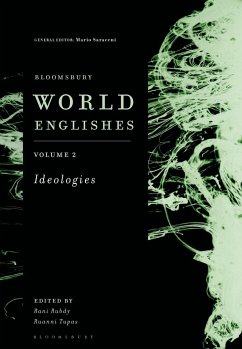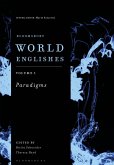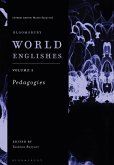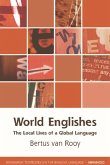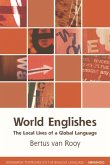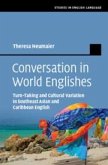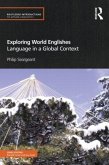Bloomsbury World Englishes Volume 2: Ideologies
Herausgeber: Rubdy, Rani; Saraceni, Mario; Tupas, Ruanni
Bloomsbury World Englishes Volume 2: Ideologies
Herausgeber: Rubdy, Rani; Saraceni, Mario; Tupas, Ruanni
- Broschiertes Buch
- Merkliste
- Auf die Merkliste
- Bewerten Bewerten
- Teilen
- Produkt teilen
- Produkterinnerung
- Produkterinnerung
Bloomsbury World Englishes offers a comprehensive and rigorous description of the facts, implications and contentious issues regarding the forms and functions of English in the world. International experts cover a diverse range of varieties and topics, offering a more accurate understanding of English across the globe and the various social contexts in which it plays a significant role. With volumes dedicated to research paradigms, language ideologies and pedagogies, the collection pushes the boundaries of the field to go beyond traditional descriptive paradigms and contribute to moving…mehr
Andere Kunden interessierten sich auch für
![Bloomsbury World Englishes Volume 1: Paradigms Bloomsbury World Englishes Volume 1: Paradigms]() Bloomsbury World Englishes Volume 1: Paradigms52,99 €
Bloomsbury World Englishes Volume 1: Paradigms52,99 €![Bloomsbury World Englishes Volume 3: Pedagogies Bloomsbury World Englishes Volume 3: Pedagogies]() Bloomsbury World Englishes Volume 3: Pedagogies52,99 €
Bloomsbury World Englishes Volume 3: Pedagogies52,99 €![World Englishes World Englishes]() Bertus van RooyWorld Englishes37,99 €
Bertus van RooyWorld Englishes37,99 €![World Englishes World Englishes]() Bertus van RooyWorld Englishes144,99 €
Bertus van RooyWorld Englishes144,99 €![Conversation in World Englishes Conversation in World Englishes]() Theresa Neumaier (Technische Universitat Dortmund)Conversation in World Englishes135,99 €
Theresa Neumaier (Technische Universitat Dortmund)Conversation in World Englishes135,99 €![Metaphor in Language and Culture across World Englishes Metaphor in Language and Culture across World Englishes]() Metaphor in Language and Culture across World Englishes76,99 €
Metaphor in Language and Culture across World Englishes76,99 €![Exploring World Englishes Exploring World Englishes]() Philip SeargeantExploring World Englishes60,99 €
Philip SeargeantExploring World Englishes60,99 €-
-
-
Bloomsbury World Englishes offers a comprehensive and rigorous description of the facts, implications and contentious issues regarding the forms and functions of English in the world. International experts cover a diverse range of varieties and topics, offering a more accurate understanding of English across the globe and the various social contexts in which it plays a significant role. With volumes dedicated to research paradigms, language ideologies and pedagogies, the collection pushes the boundaries of the field to go beyond traditional descriptive paradigms and contribute to moving research agendas forward. Volume 2: Ideologies explores the politics and economics of English, and the impact of language on local societies and cultures. In doing so, chapters discuss how English is often entangled in societal issues, such as inequality, (de-)colonization, racism, oppression and liberation.
Hinweis: Dieser Artikel kann nur an eine deutsche Lieferadresse ausgeliefert werden.
Hinweis: Dieser Artikel kann nur an eine deutsche Lieferadresse ausgeliefert werden.
Produktdetails
- Produktdetails
- Verlag: Bloomsbury Publishing PLC
- Seitenzahl: 336
- Erscheinungstermin: 5. Oktober 2023
- Englisch
- Abmessung: 240mm x 167mm x 27mm
- Gewicht: 602g
- ISBN-13: 9781350418400
- ISBN-10: 1350418404
- Artikelnr.: 67787687
- Herstellerkennzeichnung
- Libri GmbH
- Europaallee 1
- 36244 Bad Hersfeld
- 06621 890
- Verlag: Bloomsbury Publishing PLC
- Seitenzahl: 336
- Erscheinungstermin: 5. Oktober 2023
- Englisch
- Abmessung: 240mm x 167mm x 27mm
- Gewicht: 602g
- ISBN-13: 9781350418400
- ISBN-10: 1350418404
- Artikelnr.: 67787687
- Herstellerkennzeichnung
- Libri GmbH
- Europaallee 1
- 36244 Bad Hersfeld
- 06621 890
Rani Rubdy is an independent researcher. Ruanni Tupas is Lecturer in Applied Linguistics at IOE, UCL's Faculty of Education and Society, University College London, UK. General Editor: Mario Saraceni, University of Portsmouth, UK
List of Figures List of Tables List of Contributors Introduction
Mario Saraceni (University of Portsmouth
UK)
Rani Rubdy (Independent Researcher) and Ruanni Tupas (University College London
UK) Part 1: Theoretical Understandings of Global English 1. Entanglements of English
Alastair Pennycook (University of Technology Sydney
Australia) 2. Capital and the Hegemony of English in a Capitalist World-System
John P. O'Regan (University College London
UK) 3. 'The Tide is Coming in Fast': Ideologies of English
Global Linguistic Coloniality and Decolonial Pluriversalingualism
Ahmed Kabel (Al Akhawayn University in Ifrane
Morocco) 4. World Englishes and the Commodification of Language
Joseph Sung-Yul Park (National University of Singapore
Singapore) and Lionel Wee (National University of Singapore
Singapore) 5. Examining and Overcoming the Theory/Practice Divide in World Englishes
Ryuko Kubota (University of British Columbia
Canada) Part 2: Unpacking Ideologies of English 6. Linguaculture
Cultural Travel
Native-Speakerism and Small Culture Formation on the Go: Working up from Instances
Adrian Holliday (Canterbury Christ Church University
UK) 7. Ideology
Identity
and World Englishes: Toward a Heteroglossic Framework
Jerry Won Lee (University of California
Irvine
USA) and Christopher Jenks (Aalborg University
Denmark) 8. Interrogating Race in the NEST/NNEST Ideological Dichotomy: Insights from Raciolinguistics
Culturally Sustaining Pedagogy and Translanguaging
Peter De Costa (Michigan State University
USA)
Curtis Green-Eneix (Michigan State University
USA)
Wendy Li (Nagoya University of Commerce and Business
Japan) and Hima Rawal (Michigan State University
USA) 9. Translingual Englishes and the Psychological Damage of Global English
Sender Dovchin (Curtin University
Australia)
Rhonda Oliver (Curtin University
Australia) and Jaya Dantas (Curtin University
Australia) Part 3: Ideological Pluralities of English 10. Ideological Plurality: English in Policy and Practice in India
Usree Bhattacharya (University of Georgia
USA) and Ajit K. Mohanty (University of Western Ontario
Canada) 11. Challenging the Economic and Cultural Currency of English
Nathan John Albury (Leiden University
the Netherlands) 12. "We're a Nation that Speaks English": Language Ideology and Discrimination in the US English Only Movement
Rachele Lawton (Community College of Baltimore County
USA) 13. Conflicting Language Ideologies About What Counts as "English" in the Brazilian National Common Core Curriculum: Arenas for Permanences and Disruptions
Paula Szundy (Federal University of Rio de Janeiro
Brazil) Part 4: The Local Politics of Global English 14. Non-Localizable vs Localizable English:New Linguistic Hierarchies in 'Democratising' English in Spanish Education
Eva Codó (Universitat Autònoma de Barcelona
Spain) 15. Probing 'Erasure' for Transnational Language Policy and Practice: English amongst Multilingual Ismaili Muslims in Northern Pakistan and Eastern Tajikistan
Brook Bolander (Monash University
Australia) 16. Taiwan and Mandarin-English Bilingualism: International Competition and Competing Colonialisms
Funie Hsu (San José State University
USA) 17. Exploring Contested Language Ideologies in Kiribati
Indika Liyanage (Deakin University
Australia) and Tony Walker (Deakin University
Australia) Index
Mario Saraceni (University of Portsmouth
UK)
Rani Rubdy (Independent Researcher) and Ruanni Tupas (University College London
UK) Part 1: Theoretical Understandings of Global English 1. Entanglements of English
Alastair Pennycook (University of Technology Sydney
Australia) 2. Capital and the Hegemony of English in a Capitalist World-System
John P. O'Regan (University College London
UK) 3. 'The Tide is Coming in Fast': Ideologies of English
Global Linguistic Coloniality and Decolonial Pluriversalingualism
Ahmed Kabel (Al Akhawayn University in Ifrane
Morocco) 4. World Englishes and the Commodification of Language
Joseph Sung-Yul Park (National University of Singapore
Singapore) and Lionel Wee (National University of Singapore
Singapore) 5. Examining and Overcoming the Theory/Practice Divide in World Englishes
Ryuko Kubota (University of British Columbia
Canada) Part 2: Unpacking Ideologies of English 6. Linguaculture
Cultural Travel
Native-Speakerism and Small Culture Formation on the Go: Working up from Instances
Adrian Holliday (Canterbury Christ Church University
UK) 7. Ideology
Identity
and World Englishes: Toward a Heteroglossic Framework
Jerry Won Lee (University of California
Irvine
USA) and Christopher Jenks (Aalborg University
Denmark) 8. Interrogating Race in the NEST/NNEST Ideological Dichotomy: Insights from Raciolinguistics
Culturally Sustaining Pedagogy and Translanguaging
Peter De Costa (Michigan State University
USA)
Curtis Green-Eneix (Michigan State University
USA)
Wendy Li (Nagoya University of Commerce and Business
Japan) and Hima Rawal (Michigan State University
USA) 9. Translingual Englishes and the Psychological Damage of Global English
Sender Dovchin (Curtin University
Australia)
Rhonda Oliver (Curtin University
Australia) and Jaya Dantas (Curtin University
Australia) Part 3: Ideological Pluralities of English 10. Ideological Plurality: English in Policy and Practice in India
Usree Bhattacharya (University of Georgia
USA) and Ajit K. Mohanty (University of Western Ontario
Canada) 11. Challenging the Economic and Cultural Currency of English
Nathan John Albury (Leiden University
the Netherlands) 12. "We're a Nation that Speaks English": Language Ideology and Discrimination in the US English Only Movement
Rachele Lawton (Community College of Baltimore County
USA) 13. Conflicting Language Ideologies About What Counts as "English" in the Brazilian National Common Core Curriculum: Arenas for Permanences and Disruptions
Paula Szundy (Federal University of Rio de Janeiro
Brazil) Part 4: The Local Politics of Global English 14. Non-Localizable vs Localizable English:New Linguistic Hierarchies in 'Democratising' English in Spanish Education
Eva Codó (Universitat Autònoma de Barcelona
Spain) 15. Probing 'Erasure' for Transnational Language Policy and Practice: English amongst Multilingual Ismaili Muslims in Northern Pakistan and Eastern Tajikistan
Brook Bolander (Monash University
Australia) 16. Taiwan and Mandarin-English Bilingualism: International Competition and Competing Colonialisms
Funie Hsu (San José State University
USA) 17. Exploring Contested Language Ideologies in Kiribati
Indika Liyanage (Deakin University
Australia) and Tony Walker (Deakin University
Australia) Index
List of Figures List of Tables List of Contributors Introduction
Mario Saraceni (University of Portsmouth
UK)
Rani Rubdy (Independent Researcher) and Ruanni Tupas (University College London
UK) Part 1: Theoretical Understandings of Global English 1. Entanglements of English
Alastair Pennycook (University of Technology Sydney
Australia) 2. Capital and the Hegemony of English in a Capitalist World-System
John P. O'Regan (University College London
UK) 3. 'The Tide is Coming in Fast': Ideologies of English
Global Linguistic Coloniality and Decolonial Pluriversalingualism
Ahmed Kabel (Al Akhawayn University in Ifrane
Morocco) 4. World Englishes and the Commodification of Language
Joseph Sung-Yul Park (National University of Singapore
Singapore) and Lionel Wee (National University of Singapore
Singapore) 5. Examining and Overcoming the Theory/Practice Divide in World Englishes
Ryuko Kubota (University of British Columbia
Canada) Part 2: Unpacking Ideologies of English 6. Linguaculture
Cultural Travel
Native-Speakerism and Small Culture Formation on the Go: Working up from Instances
Adrian Holliday (Canterbury Christ Church University
UK) 7. Ideology
Identity
and World Englishes: Toward a Heteroglossic Framework
Jerry Won Lee (University of California
Irvine
USA) and Christopher Jenks (Aalborg University
Denmark) 8. Interrogating Race in the NEST/NNEST Ideological Dichotomy: Insights from Raciolinguistics
Culturally Sustaining Pedagogy and Translanguaging
Peter De Costa (Michigan State University
USA)
Curtis Green-Eneix (Michigan State University
USA)
Wendy Li (Nagoya University of Commerce and Business
Japan) and Hima Rawal (Michigan State University
USA) 9. Translingual Englishes and the Psychological Damage of Global English
Sender Dovchin (Curtin University
Australia)
Rhonda Oliver (Curtin University
Australia) and Jaya Dantas (Curtin University
Australia) Part 3: Ideological Pluralities of English 10. Ideological Plurality: English in Policy and Practice in India
Usree Bhattacharya (University of Georgia
USA) and Ajit K. Mohanty (University of Western Ontario
Canada) 11. Challenging the Economic and Cultural Currency of English
Nathan John Albury (Leiden University
the Netherlands) 12. "We're a Nation that Speaks English": Language Ideology and Discrimination in the US English Only Movement
Rachele Lawton (Community College of Baltimore County
USA) 13. Conflicting Language Ideologies About What Counts as "English" in the Brazilian National Common Core Curriculum: Arenas for Permanences and Disruptions
Paula Szundy (Federal University of Rio de Janeiro
Brazil) Part 4: The Local Politics of Global English 14. Non-Localizable vs Localizable English:New Linguistic Hierarchies in 'Democratising' English in Spanish Education
Eva Codó (Universitat Autònoma de Barcelona
Spain) 15. Probing 'Erasure' for Transnational Language Policy and Practice: English amongst Multilingual Ismaili Muslims in Northern Pakistan and Eastern Tajikistan
Brook Bolander (Monash University
Australia) 16. Taiwan and Mandarin-English Bilingualism: International Competition and Competing Colonialisms
Funie Hsu (San José State University
USA) 17. Exploring Contested Language Ideologies in Kiribati
Indika Liyanage (Deakin University
Australia) and Tony Walker (Deakin University
Australia) Index
Mario Saraceni (University of Portsmouth
UK)
Rani Rubdy (Independent Researcher) and Ruanni Tupas (University College London
UK) Part 1: Theoretical Understandings of Global English 1. Entanglements of English
Alastair Pennycook (University of Technology Sydney
Australia) 2. Capital and the Hegemony of English in a Capitalist World-System
John P. O'Regan (University College London
UK) 3. 'The Tide is Coming in Fast': Ideologies of English
Global Linguistic Coloniality and Decolonial Pluriversalingualism
Ahmed Kabel (Al Akhawayn University in Ifrane
Morocco) 4. World Englishes and the Commodification of Language
Joseph Sung-Yul Park (National University of Singapore
Singapore) and Lionel Wee (National University of Singapore
Singapore) 5. Examining and Overcoming the Theory/Practice Divide in World Englishes
Ryuko Kubota (University of British Columbia
Canada) Part 2: Unpacking Ideologies of English 6. Linguaculture
Cultural Travel
Native-Speakerism and Small Culture Formation on the Go: Working up from Instances
Adrian Holliday (Canterbury Christ Church University
UK) 7. Ideology
Identity
and World Englishes: Toward a Heteroglossic Framework
Jerry Won Lee (University of California
Irvine
USA) and Christopher Jenks (Aalborg University
Denmark) 8. Interrogating Race in the NEST/NNEST Ideological Dichotomy: Insights from Raciolinguistics
Culturally Sustaining Pedagogy and Translanguaging
Peter De Costa (Michigan State University
USA)
Curtis Green-Eneix (Michigan State University
USA)
Wendy Li (Nagoya University of Commerce and Business
Japan) and Hima Rawal (Michigan State University
USA) 9. Translingual Englishes and the Psychological Damage of Global English
Sender Dovchin (Curtin University
Australia)
Rhonda Oliver (Curtin University
Australia) and Jaya Dantas (Curtin University
Australia) Part 3: Ideological Pluralities of English 10. Ideological Plurality: English in Policy and Practice in India
Usree Bhattacharya (University of Georgia
USA) and Ajit K. Mohanty (University of Western Ontario
Canada) 11. Challenging the Economic and Cultural Currency of English
Nathan John Albury (Leiden University
the Netherlands) 12. "We're a Nation that Speaks English": Language Ideology and Discrimination in the US English Only Movement
Rachele Lawton (Community College of Baltimore County
USA) 13. Conflicting Language Ideologies About What Counts as "English" in the Brazilian National Common Core Curriculum: Arenas for Permanences and Disruptions
Paula Szundy (Federal University of Rio de Janeiro
Brazil) Part 4: The Local Politics of Global English 14. Non-Localizable vs Localizable English:New Linguistic Hierarchies in 'Democratising' English in Spanish Education
Eva Codó (Universitat Autònoma de Barcelona
Spain) 15. Probing 'Erasure' for Transnational Language Policy and Practice: English amongst Multilingual Ismaili Muslims in Northern Pakistan and Eastern Tajikistan
Brook Bolander (Monash University
Australia) 16. Taiwan and Mandarin-English Bilingualism: International Competition and Competing Colonialisms
Funie Hsu (San José State University
USA) 17. Exploring Contested Language Ideologies in Kiribati
Indika Liyanage (Deakin University
Australia) and Tony Walker (Deakin University
Australia) Index

